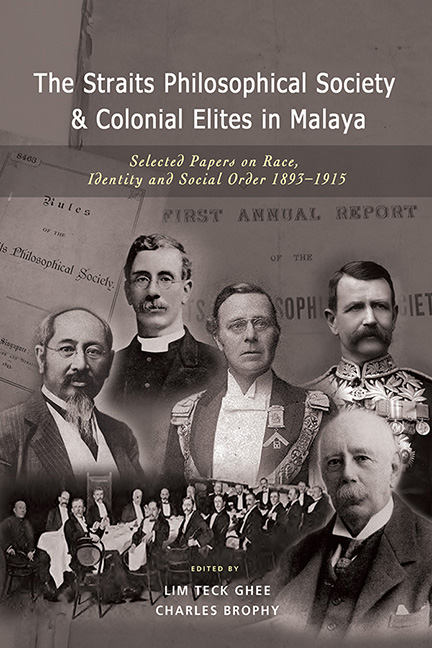 The Straits Philosophical Society and Colonial Elites in Malaya
The Straits Philosophical Society and Colonial Elites in Malaya 1 - Introduction
Published online by Cambridge University Press: 09 January 2024
Summary
The Straits Philosophical Society and Colonial Elites in Malaya: Perspectives on Race, Identity and Social Order
Founded in Singapore in 1893, the Straits Philosophical Society was, in the tradition of other learned societies throughout the British Empire, a space within the colony for the “critical discussion of questions in Philosophy, History, Theology, Literature, Science and Art”. With a membership restricted to graduates of British and European universities, fellows of British or European learned societies and those with “distinguished merit in the opinion of the Society in any branch of knowledge”, it was a meeting place for the educated elite of the colony made up of colonial civil servants, soldiers, missionaries, businessmen, as well as prominent Straits Chinese.
Colonial associations have been increasingly recognized in colonial historiography as important sites in the lifeworld of the colony. Sports clubs, church associations, charitable groups and educational institutions have been studied as spaces in which the social life of the colony, the political, social, and economic ideologies and the ordering of colonial rule, particularly along racial lines, were reproduced and reinforced. The clubhouse, in particular, has been shown by historians to be a pivotal institution—becoming a sacred ground for Europeans as a bastion of racial prestige, whilst also reinforcing the mystique of the ruling caste. The limited, but politically significant, integration of colonial subjects it permitted was similarly a vital wellspring of colonial hegemony.
More recently scholarly societies have been studied as important centres in the intellectual and ideological life of the colony. Firstly, as spaces for the dissemination of colonial knowledge and systems of thought; and secondly, as spaces in which the colonized learned and responded to the thinking of the representatives of colonial power. Su Lin Lewis, touching on the Straits Philosophical Society, the Siam Society and the Burma Research Society, has argued for the colonial learned society as a site of “sociability and intellectual exchange” producing independent intellectual cultures which would later contribute to the rise of social reform movements and early nationalist movements. These societies, she argues, “contributed to an emerging intellectual culture of libraries, public lectures, and universities” and the flow of intellectual ideas through “correspondence, travel, and exchanges of publications”.
- Type
- Chapter
- Information
- The Straits Philosophical Society and Colonial Elites in MalayaSelected Papers on Race, Identity and Social Order 1893-1915, pp. 1 - 40Publisher: ISEAS–Yusof Ishak InstitutePrint publication year: 2023
